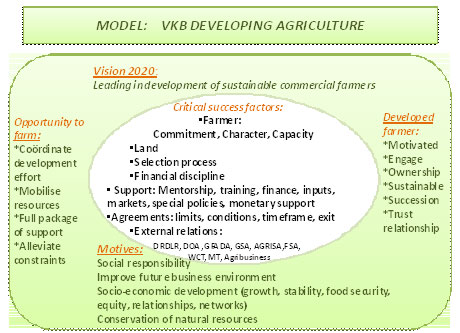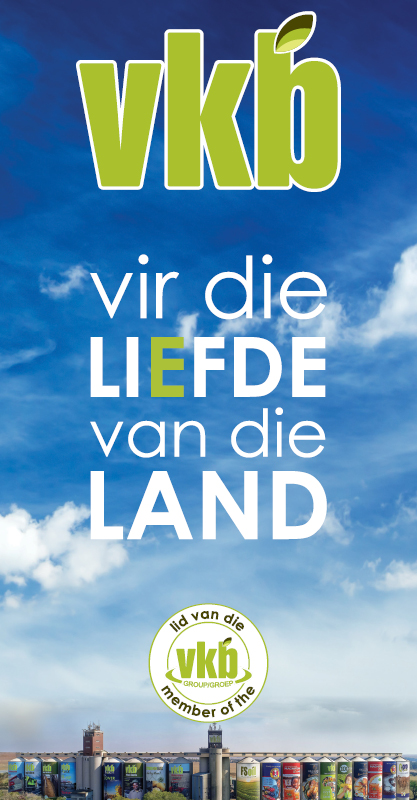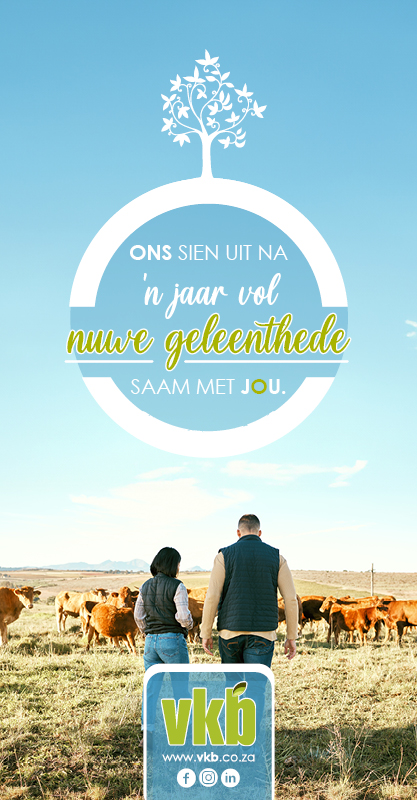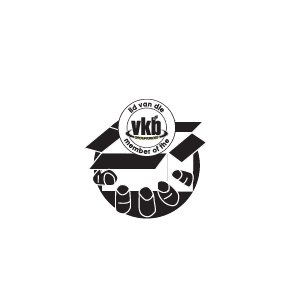Agricultural Development
Scope
VKB strives to play a positive role in the transformation of agriculture in South Africa. Besides internal renewal and responsible corporate citizenship, it also includes a focused outward strategy to develop emerging farmers. The overall goals of this is economic growth, socio-economic development, job creation, food security and the conservation of the natural environment.
VKB has established specialised Agricultural Development Divisions in its two respective focal regions, namely the Free State and Limpopo. Staffed with agricultural economists, technical agriculturalists and on-farm mentors, it has the experience and capacity to deliver superior development outcomes.
VKB has information of 500 developing farmers in its data bank, and is directly involved in the development of 130 emerging farmers with a total crop surface area of 7 000 hectare. In the Free State area the focus is more on commercial mixed farms with grains as the main crops (50 farmers with average crop surface areas of 130 hectares), while in Limpopo the focus is on small-scale farmers with intensive crops under irrigation (80 farmers with an average crop surface area of 5 hectares per farmer).
VKB’s contribution to developing farmers annually exceeds 3% of its net profit after tax, making it a Level 1 contributor to Black Economic Empowerment (BEE) in terms of enterprise development criteria.
Development model

Sustainability and approach
The aspiration to establish sustainable commercial novice farmers stands central to the VKB development initiative. Sustainability means that the farmers’ goals regarding the economical, social and natural environment must be reached.
Development systems, on the one hand, was designed to offer farmers a sustainable business opportunity and on the other hand to induce the right mindset with the farmers. The success hereof can be measured in the extent to which the following outcomes are reached:
- An engaged farmer who accepts ownership and full responsibility of the farm;
- The continued existence of sustainable production with adequate provision for capital extension and needs of the household;
- Maintaining ethical behaviour and productive relationships towards the community and business partners; and
- Successful business succession to carry over the farm to the following generations.
Thus, VKB’s approach is to establish long-term relationships with farmers, to be involved until the farmer can stand on his own feet. This approach is one of a more in-depth focus to fewer farmers in order to reach sustainability. This stands in contrast to a take-and-leave approach or to supply guidance over a wider front. The latter function rather appertains to governmental and commodity institutions.
Full package of support
VKB has accepted the development challenge by developing a complete end to end support programme for emerging farmers over the past ten years in order to provide:
- A comprehensive package of support regarding training, guidance, mentorship, finance, input procurement as well as access to markets;
- Coordination of development amongst role-players and mobilising development funds and means; and
- The alleviation of structural constraints of farmers regarding knowledge, management capacity, capital formation, mechanisation, financing, markets, resources status and economies of scale.
Financing
The financing of emerging farmers is challenging because of low profitability and high risks pertaining to South African agriculture, and it is further complicated by lack of collateral. This emphasises the importance of technical and economic mentorship to ensure good farming practices in order to lower financial risk. Furthermore, it requires special financing policy measures, as well as the assignment of credit managers who specifically focus on the unique needs and requirement of developing farmers.
Training
Agri-Seta accredited training:
Training to equip emerging farmers with knowledge of modern farm management remains a strong force behind VKB’s development strategy. Since 2008 VKB enrolled 236 developing farmers in Agri-Seta accredited farm management programmes with ITO Batho Pele as the leading training institution.
Practical skills on farm level through mentorships
Practical skills development takes place through continuous guidance and mentorships where farmers are visited and supported on the farms. Central to successful mentorship are farmers’ goals and perceptions, as well as the building of mutual trust and education in healthy business conduct. It is important that farmers contact representatives of agri-businesses themselves to establish business contacts. Thus, the focus must be to empower and motivate farmers without taking over their responsibilities and ‘farming on their behalf’. A fine balance must be established and this remains one of the big development challenges.
Financial management skills
Economical aspects are often neglected in support to developing famers. However, financial management, including record keeping, business planning and budget control, is an important management function and even more so with novice farmers. Like many other farmers, emerging farmers shy away from administrative aspects, and it is further compromised because of low literacy. A huge challenge lies therein that emerging farmers will take ownership of business outcomes with accompanying risks. This can only happen when farmers have developed adequate understanding by physically being involved in the compilation of business planning and record-keeping.
Development of asparagus and forming of partnerships
A project in which farmers were empowered to enter the production of asparagus in the Eastern Free State can serve as an example of the potential of the formation of partnerships and cooperation amongst institutions. The project has developed as an attempt to address one of the most important structural challenges of wheat farmers, namely insufficient economies of scale. We searched for a high value plant to include in grain producers’ crop branching under dry land conditions. Asparagus that was traditionally planted in the Eastern Free State was identified. However, access to asparagus by emerging farmers was limited by high capital requirements, specialised knowledge and market access.
These limitations were conquered through cooperation and the establishment of strategic partnerships. The most crucial elements of the production of asparagus include:
- Asparagus is a high value crop. It also is labour and management intensive.
- During the harvesting period (which can stretch over two to six months between August and February) asparagus must be harvested twice per day, every day of the week. Strict quality requirement prevail and the product must be kept cool at all times without interruption in the cool chain.
- Asparagus is a long-term crop with a lifespan of 13 years, depending on how well it is maintained.
- Seed is not available locally and must be imported. Thereafter crowns or seedlings must be cultivated where upon establishing can take place after a year.
- Establishing the crop is capital intensive (R65 000 per hectare) and can typically only be harvested three years after establishing.
- Technical knowledge and product details are not readily available in South Africa.
- Asparagus can be produced for the fresh (“green”) or processed (“white”) market. The production of fresh asparagus is the market segment that shows the fastest growth.
- Distribution of asparagus mainly takes place through retail groups, which limits market access.
The main elements of the joined project and partnerships include:
- Nine novice farmers were identified, four in the QwaQwa en five in the Rosendal area.
- These farmers were developed to each produce grain on his farm.
- In order to extend their economies of scale, 15 hectares of asparagus were developed for each farmer.
- The asparagus were established on two farms (one in each area), on land that was acquired through long-term lease agreements.
- Funding took place through grants from the JobsFund, as well as loans from VKB (that also partly falls under Landbank’s REM programme).
- In order to accomplish collective management of the farms, two co-operations were formed by the farmers.
- Until after the first year of establishing, farmers were supported through mentorship, import of seed, cultivating seedlings, establishment and technical advice.
- A huge breakthrough occurred when a partnership amongst the two co-operations and Denmar was formed.
- The most crucial advantage of the partnership with Denmar is that access was created through Denmar to the main retail groups (PnP, Checkers, Spar, Fruit& Veg), as well as export markets, under the brand Denbi.
- Denmar’s packaging and extended distribution network, as well as technical skills and knowledge, was to the advantage of emerging farmers.
- Through this partnership farmers are not treated as contract growers and their price is derived from the end-consumer price. The focus also falls on joint market development under Denmar’s guidance.
- In order to comply with the requirements for market access to retail and export markets, Global G.A.P. accreditation was acquired. Basic infrastructure (washing and cooling) were also created on farms.



























